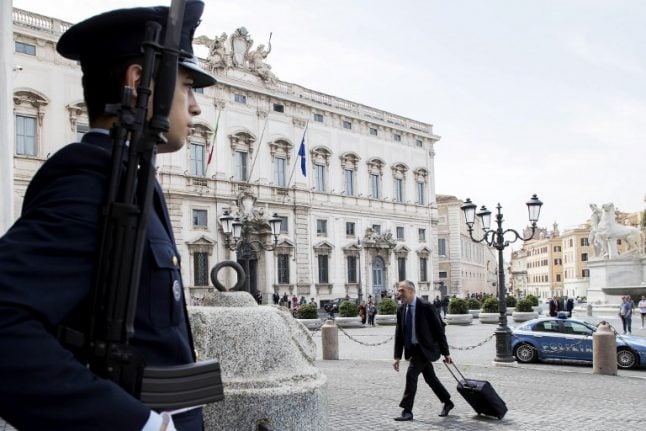However, going back to the polls presents Italy with a range of problems, from the upheaval of old political alliances to the possibility of a new electoral system being put in place.
Here's what could be next for Italy.
Cottarelli government
The first step in this process will be economist Carlo Cottarelli's attempt to form a caretaker government.
On Monday Cottarelli, a former International Monetary Fund director and noted advocate of austerity measures, accepted President Sergio Mattarella's mandate to become prime minister.
Now he has to quickly select his cabinet before confirming his position as PM and seeking unlikely approval from parliament.

President Sergio Mattarella (L) with Carlo Cottarelli on Monday. Photo: Paolo Giandotti/Ufficio Stampa Presidenza della Repubblica/AFP
Parliamentary mistrust
Cottarelli faces an uphill battle as the majority in parliament is held by the two parties whose government deal fell apart on Sunday, the anti-establishment Five Star Movement and nationalist League. The chances of members of either party passing a vote of confidence on Cottarelli and his team of ministers are almost non-existent.
After the likely 'no' vote Cottarelli's government will be charged with managing current affairs pending new elections, the date of which will be determined by the president in agreement with the political leaders and the speakers of the two houses of parliament.
On Monday Cottarelli said that fresh elections would be held “after August” should his government line-up not win a confidence vote, and at the “start of 2019” if it did.
Balance of power
The general elections held on March 4th were dominated by a right-wing coalition that won the most votes with 37 percent, while Five Star became Italy's largest single party with just under 33 percent. The centre-left coalition led by the Democratic Party (PD) came third with just 23 percent.
The right-wing grouping was initially led by Silvio Berlusconi's Forza Italia but ended up in the hands of Matteo Salvini after his far-right League won 17 percent, the highest share within the coalition.
Polling carried out recently by IndexResearch put the League at 22 percent, while other parties' ratings largely stayed the same as in March.
Le intenzioni di voto degli italiani a oggi. @Index_Research #Piazzapulita pic.twitter.com/hfpfuJ4q8K
— PiazzapulitaLA7 (@PiazzapulitaLA7) May 24, 2018
However, it's not clear that the right will survive the current crisis. Berlusconi gave Salvini the go-ahead to negotiate with Five Star but the former premier is pro-Europe and did not like the two parties' joint government programme.
Salvini has said he would break his alliance with Berlusconi if Forza Italia voted for the Cottarelli government, and although FI party officials announced on Monday that they would vote against, Italian media are not ruling
out the possiblity of a “pact of non-aggression” between the League and Five Star for the new elections.
New electoral system?
Italy's political stalemate is in part the result of the current electoral system, heavily weighted towards a proportional ballot in a country divided into three political forces: the right, the anti-establishment and the
centre-left.
“If we return to the polls with the same electoral law, we will find ourselves with the same problems as we have today,” said Senate speaker Maria Elisabetta Alberti Caselatti.
On Monday Salvini promised that he would sit down with Five Star leader Luigi Di Maio and discuss a new electoral system.
“The only thing that is certain now is that there is a majority in parliament that can propose and approve laws, and the first thing we will do is start a discussion on a new electoral law,” he said.
READ MORE: How does Italy's electoral law actually work?

Photo: Andreas Solaro/AFP
By Ljubomir Milasin



 Please whitelist us to continue reading.
Please whitelist us to continue reading.